MercoPress. South Atlantic News Agency
Brazil
-
Saturday, March 19th 2016 - 09:13 UTC
Brazilian situation shows division among Unasur members
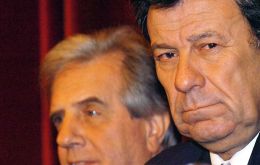
Unasur, the Union of South American Nations is divided on how to address the Brazilian situation: while Uruguay, Venezuela, Ecuador and Bolivia have agreed on a strong statement in support of president Dilma Rousseff, Argentina expressed 'institutional support' and Chile abstained.
-
Saturday, March 19th 2016 - 08:58 UTC
Brazilian lawmakers make an exception and begin impeachment procedure against Rousseff on Friday
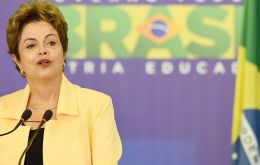
The Brazilian opposition parties, meeting in the Lower House of Congress sped up the impeachment process against president Dilma Rousseff by holding a session on Friday, a day that lawmakers are normally away from Brasilia.
-
Saturday, March 19th 2016 - 06:54 UTC
Lula calls for justice, claims he is a victim of “unjustified acts of violence”
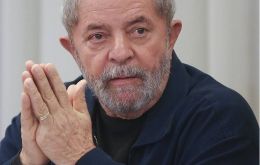
Embattled former Brazilian president Lula da Silva on Friday released an open letter calling for “justice” as he affirmed he is the victim of “unjustified acts of violence.”“Justice, it is only justice what I expect for me and everybody within the framework of in-force democratic rule of law,” Lula said a day after he was sworn-in as the chief of staff of Brazilian President Dilma Rousseff and a judge in that country issued an injunction blocking his appointment.
-
Saturday, March 19th 2016 - 06:40 UTC
Lula takes to the streets claiming there's a coup, but he is no match to the over three million of Sunday
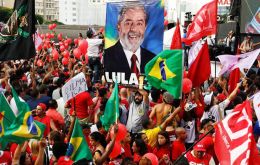
Brazilian President Dilma Rousseff's supporters took to the streets on Friday to fight back at attempts to oust her, as a flurry of court battles raged over her controversial cabinet appointment of predecessor Lula da Silva. Waving the red flags of the ruling Workers' Party, (PT) tens of thousands of demonstrators took to the streets in the country's largest city, Sao Paulo, greeting Lula with thunderous cheers when he was hoisted onto a parked truck to address the crowd.
-
Saturday, March 19th 2016 - 06:09 UTC
Neymar ordered to pay US$ 52.2 million in back taxes to the Brazilian Treasury

A Brazilian court has found Barcelona striker Neymar guilty of tax fraud and ordered him to pay 188.8 million Reais (US$ 52.2) in back taxes, interest and penalties according to reports on the local media on Friday.
-
Saturday, March 19th 2016 - 05:54 UTC
Argentina concerned about Brazilian political situation's impact on bilateral trade
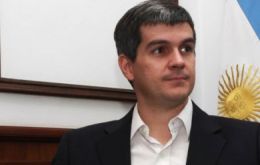
The Argentine government expressed its concern about the impact the Brazilian political crisis will have on trade between the two countries. Argentina and Brazil are the principal partners in the Mercosur common market, which also includes Paraguay, Uruguay and Venezuela. Brazil and Argentina are mutually principal destinations for their manufactured goods, meaning that bilateral trade is crucial for both.
-
Friday, March 18th 2016 - 03:18 UTC
Lula cabinet chief for twenty minutes; street protests in Brazilian cities
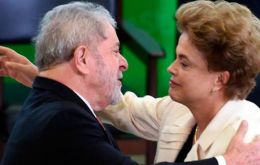
Former leader Lula da Silva was sworn in as President Dilma Rousseff's chief of staff on Thursday amid a deepening crisis in Brazil as protests against his appointment continued for a second day and a judge sought to block the move.
-
Friday, March 18th 2016 - 03:12 UTC
Brazilian markets surge on prospects Rousseff will be removed
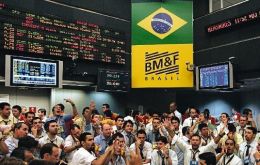
Brazilian share prices surged on Thursday to close 6.6% higher, a seven-year record, after fresh setbacks to populist President Dilma Rousseff raised the prospect of her being driven from power.
-
Thursday, March 17th 2016 - 06:38 UTC
“When a rich man steals they name him minister”, Lula da Silva quote in 1998

“When a poor man steals, he ends in jail; when a rich man steals he is named minister”, the phrase belongs to Lula da Silva back in 1998 when he was leading the opposition, and it is now being repeated in social networks. In effect, on Wednesday Lula was named chief of staff by president Dilma Rousseff, who also phoned him to tell him she would be sending him the official decree on his nomination, so that he make use of it “if necessary”.
-
Thursday, March 17th 2016 - 06:13 UTC
Protests erupt in Brazil as Rousseff confirms Lula da Silva as chief of staff

Protests erupted in Brazilian cities on Wednesday after President Dilma Rousseff named her predecessor Lula da Silva chief of staff and a taped telephone conversation fed opposition claims the appointment was meant to shield Lula from prosecution.
